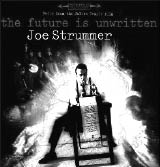Joe Strummer: The Future Is Unwritten
by Donny Kutzbach

In an early photo of the Clash from 1977, the ever-sloganeering Joe Strummer—the band’s primary singer and the unrelenting mouthpiece and conscience—posited his feelings with a bit of punk rock de rigeur of the day. In broad, spray-paint stencil letters, his homemade shirt read “Passion is a Fashion,” in what stands up as pure dictum that crystallized not only Strummer’s feeling for the music he was making but how he lived his life. Though he passed in 2002, that passion and his exuberant spirit have lived on through his fiery, idealistic brand of rock and roll. Now that spirit has been captured to celluloid in a 2007 biopic/doc by rock chronicler and year-zero punk participant Julien Temple, Joe Strummer: The Future Is Unwritten. The soundtrack, interspersed with spoken-word snatches of Strummer doing his own bit of radio clash broadcast jamming, is far from the straight-ahead and obligatory artist career retrospective. While The Future Is Unwritten offers some rarities that will leave Clash completists chuffed, the real story here—and the way that Temple chooses to help tell Strummer’s story in the film—is the textured aural vérité that provides the panoramic musical tableaux of the subject’s life. The story unfolds under the roof of tracks like Elvis Presley’s proto-punk, guttural soul “Crawfish”—a million miles from what most think of when it comes to the King—as well as Tim Hardin’s masterful folk ballad “Black Sheep Boy” and Nina Simone’s absorbing take on the Bee Gee’s “To Love Somebody.” Tracks from motivating forces like Dylan, MC5, U-Roy and key inspiration Woody Guthrie also figure into the picture. Strummer’s non-Clash material, like his early era with the 101er’s, represented by the infectious pint of pub rock “Keys to My Heart.” His twilight time with the Mescaleros is represented by “Johnny Appleseed,” a track also currently enjoying a second life at the opening credits of HBO’s offbeat surfers and messiah serial, John From Cincinnati. All in all, it’s a magnificently thought-out, musical fisheye view of what went into one of the most important and often unsung cultural figures of the last 30 or so years. The film has only been screened at festivals thus far, with a targeted wide release set for fall, but the soundtrack is available to impress you into the ideological and rocking sphere of Strummer now. Also on the racks is an update of the Clash’s collected singles—a popular UK import in the early days of CDs when availability of the band’s catalog had gone awry—that includes all 19 a-sides that the band issued in their existence in an odd, non-chronological order. The one carrot with this version is fantastic liner notes with rock luminaries—Pete Townshend, Ian Brown, the Edge, Bobby Gillespie and Billy Bragg among them—writing about each of the tracks. Otherwise most Clash fans will have what’s here in other places. For those in need of a lesson on “the only band that mattered” however, The Singles is not a bad starting point
|
Issue Navigation> Issue Index > v6n26: Recycle Your Cash (6/28/07) > Left of the Dial > Joe Strummer: The Future Is Unwritten This Week's Issue • Artvoice Daily • Artvoice TV • Events Calendar • Classifieds |









 Current Issue
Current Issue